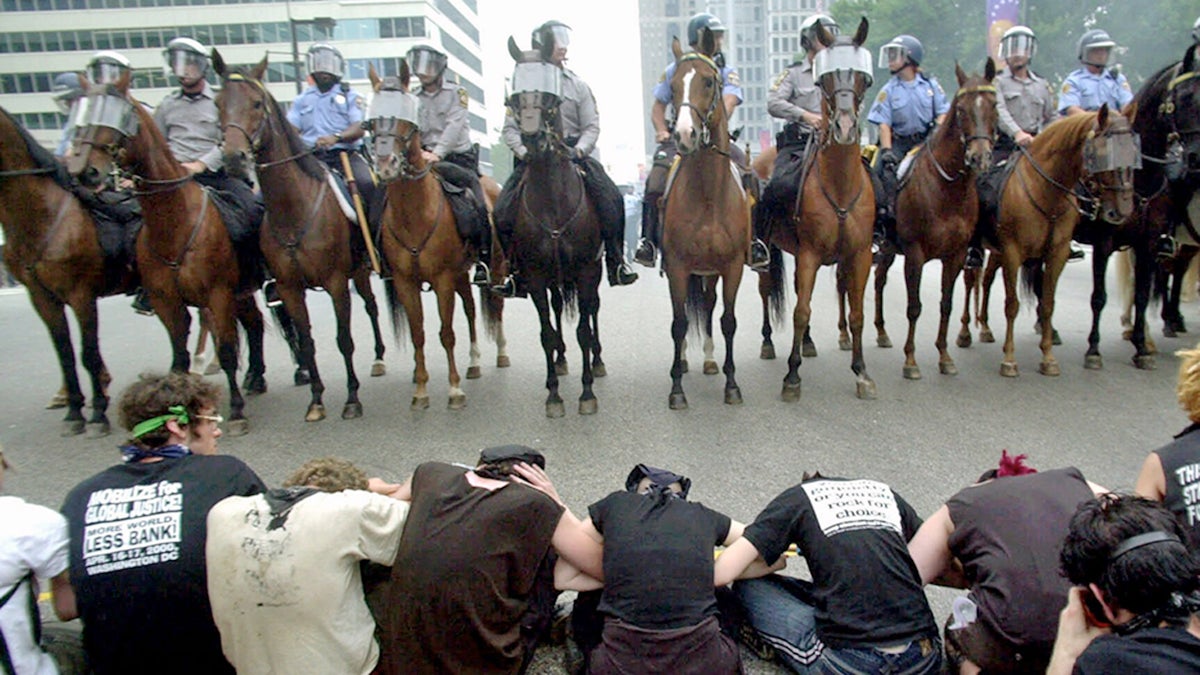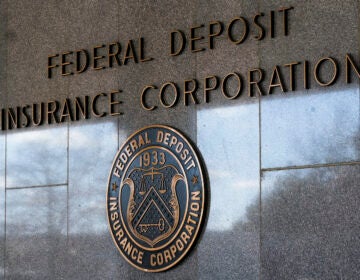Riot ready? Philly in talks for protest insurance ahead of DNC

Police stand by protesters who are sitting in a street near City Hall during the Republican National Convention
Philadelphia is getting “law-enforcement liability insurance” — more commonly known as riot or protest insurance — to cover potential claims of police brutality and other civil-rights violations that could arise out of this summer’s Democratic National Convention protests.
City and DNC committee officials are still working out the details, including how much the policy will cost and what it will cover, according to mayoral spokesman Mike Dunn and DNC host committee spokeswoman Anna Adams-Sarthou.
The city hasn’t picked a firm to broker the policy, Dunn said. South River Partners, a Maryland-based insurance brokerage firm, will insure the DNC for everything else, including general liability, automobile, event cancellation, terrorism and even things like “crime, kidnap, ransom and extortion” and “accidental death and dismemberment,” Adams-Sarthou added. She declined to say how much South River Partners was paid.
The purchase of this type of insurance policy isn’t unusual.
Cleveland paid $1.5 million to hire a brokerage firm to help the city get a $10 million insurance policy to cover claims resulting from police misconduct during the Republican National Convention, which will be held July 18-21 there, according to Cleveland.com. Convention preparation included the city buying 2,000 sets of riot gear, including riot-control suits and collapsible batons, and three miles of interlocking steel barriers for crowd control.
And when Philadelphia hosted the RNC in 2000, the host committee paid the Lexington Insurance Company $100,000 for a $3 million insurance policy to cover potential claims for police assault and battery, wrongful arrest, defamation, discrimination, malicious prosecution and such things.
Sure enough, how Philly authorities handled protesters became the stuff of headlines – and lawsuits.
Before the convention, undercover officers infiltrated activist groups to spy on them, and police raided and closed a warehouse where activists planned. During the RNC, authorities corralled protesters in “free-speech zones,” and police arrested more than 400 of them, with judges jailing some on $1 million bail. Most of those arrested were later acquitted and filed lawsuits.
So was the insurance worth it?
Just looking at the numbers, probably not: The city paid tens of thousands of dollars to settle 15 lawsuits – payouts dented, legal observers agree, by the furor over 9/11.
But city risk manager Barry Scott said such insurance is always worthwhile when it comes to protecting public money.
“It’s there in case something goes really wrong. We don’t want to have any loss, but if we have a big loss, it’s better to have insurance than to not to have insurance,” Scott said. “This is always what we’re doing: We’re looking to protect the city’s financial resources for the taxpayers who have given us those dollars to steward. So if we are able to buy insurance to do that, then it’s a great deal.”
And subsequent goofs in handling protesters have cost the city big-time. In April, the city agreed to pay $200,000 to settle claims by Occupy protesters that police had violated their rights during their 2011 encampment outside City Hall.
Other cities faced even bigger pricetags for bungling their response to ralliers. New York City, for example, had no protest insurance when it hosted the 2004 RNC and ended up paying $18 million in 2014 to settle dozens of lawsuits filed over protesters’ civil rights.
Since New York, other host cities have been sure to get protest insurance, usually for $10 million, including St. Paul and Denver in 2008 and Tampa and Charlotte in 2012.
Still, some critics see protest insurance as proof that officials essentially plan to trample citizens’ civil rights.
“The city, for the most part, is self-insured. And the city doesn’t do this for other events. So why now, unless they actually intend to do things that they believe will induce lawsuits?” said Lawrence Krasner, a civil rights attorney who often defends protesters. “In order to prove a civil rights violation, you have to prove deliberate indifference to the rights of others. To me, this is profoundly offensive. I don’t want my tax money to be spent so that law enforcement in this city have financial coverage so they can be deliberately indifferent to my rights.”
Kris Hermes, author of “Crashing the Party: Legacies and Lessons from the RNC 2000,” agreed: “General liability insurance for municipalities makes sense, but it’s the insurance that covers the police against an array of civil rights violations that’s a problem.”
Philadelphia has a lively protest scene, with activists rallying every few days on everything from Black Lives Matter to public school funding to raising the minimum wage.
The DNC, set for July 25 to 28, promises to make it livelier, with ongoing tensions between Hillary Clinton and Bernie Sanders supporters threatening to erupt here.
“The good news here is that this time, law enforcement will be up against the ubiquity of cellphones: Most protesters have cellphones that allow them to take video,” Krasner said. “There will be recorded evidence (of police and protesters’ conduct). So this is going to be really interesting.”
Editor’s note: This story has been updated to reflect that South River Partners may not be the insurance firm to broker the law enforcement liability policy, though they will insure the DNC for everything else.
WHYY is your source for fact-based, in-depth journalism and information. As a nonprofit organization, we rely on financial support from readers like you. Please give today.




